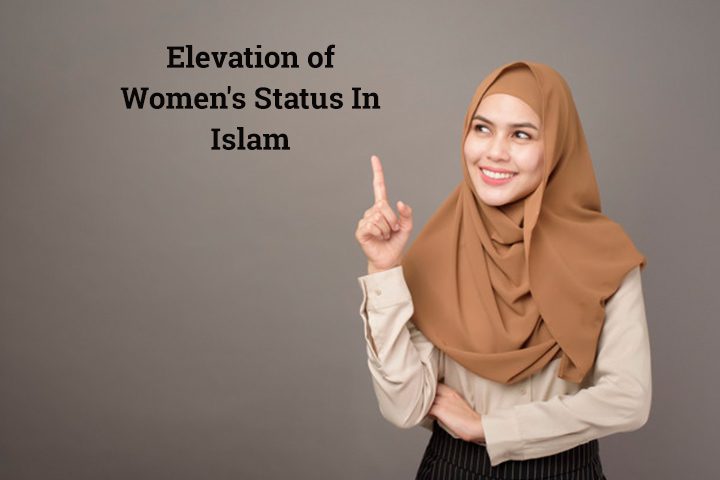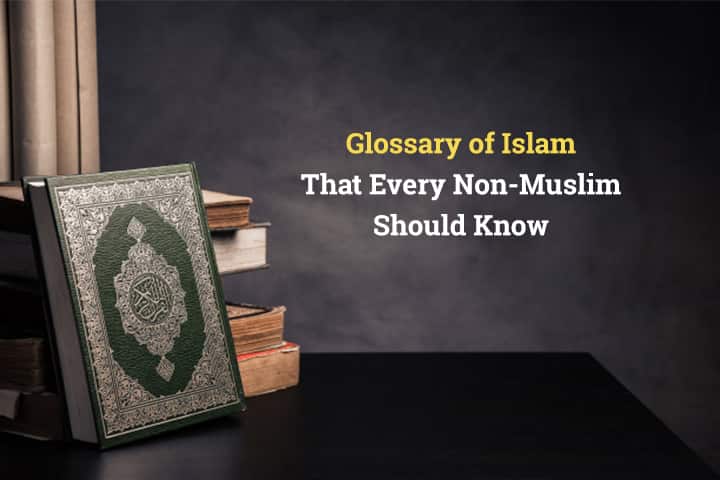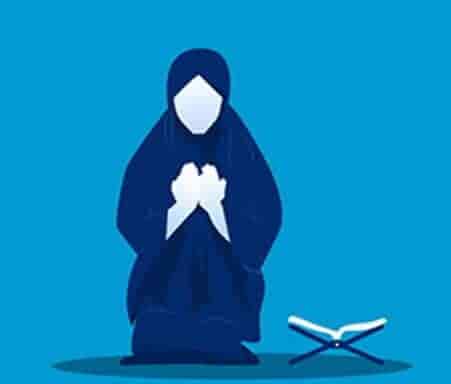Islam has raised the status of women in Islam. Many, upon hearing this, might assume it to be an oxymoron because the prevalent idea -at least in the West – is that Islam doesn’t lift the status of women, yet that Islam oppresses and suppresses women. In connection to this, it must be said that today, there are fundamentally two world views. These two perspectives are frequently in strife – not just on the individual level where singular people are settling on decisions, yet in addition on the worldwide level as far as the discussion over the legitimacy and rightness of these two world perspectives.
The Western view is that ladies are raised distinctly in the West what’s more, that they are getting an ever-increasing number of rights with the passage of time, while their sisters – they state – in the Islamic world are still being suppressed. The Muslims who they experience say that in fact it is the Islamic system that gives the genuine freedom for men and women alike, and women in the West just as men, are deluded into a thought of freedom which really doesn’t exist.
The other view which I might want to discuss in more detail is the Islamic view. What does Islam look like at the issue of women? Indeed, as a matter of first importance, we ought to comprehend that Muslims dissimilar to, for example, the Greek scholars or the French journalists after the French unrest, don’t feel that their ideas, thoughts and convictions are those of individual men. But instead they accept that what they are educated, what they accept, what they practice, and all that is attached to this, is a piece of an awesome disclosure given to them by God.
Thus, its reality and veracity isn’t faulty as a result of it being divine revelation. The contention is that God knows best what He made. He made people, He is a God of shrewdness, and a God of all information thus in this manner He recognizes what is ideal. Furthermore, He declares what is best for mankind, His animals. Along these lines, Muslims attempt to live by a code of law which is a statement of that conviction.
What quran shows the status of women in Islam
So this being something that was shown 1400 years ago was a revolutionary thought as in it is just inside the most recent 100 years or with the goal that the issue of status of women in Islam being full human beings has come to be accepted in western scholarly circles. At first, women were not considered full human beings.
The Qur’an in showing the origins of human beings tells them, the translation of which would be something like “O humanity! Verily we have created you from a single male and a single female and have made you into tribes and peoples so that you may know one another. Verily the most honorable of you are those who are most pious with God.” [49:13] This verse in the Qur’an teaches that humans come from a single male and a single female. The indication here is that the male and female in terms of their human nature are at an equal level. Likewise, another verse, from a chapter which is known in the Qur’an as the chapter of status of women in Islam – because most of the issues discussed there are laws dealing with women – starts off with a verse which could be translated as “O humanity! Verily We have created you from a single soul, and have made from it its mate,” this is a reference to Adam and Eve, “and have made from both of them many people, men and women, and scattered them throughout the earth.” [4:1] So here again is the issue of men and women and all human beings coming from a single source, a single family, a single set of parents. This shows that status of women in Islam share in full humanity with men.
In like manner in the conventions of the Prophet Muhammad (sallallaahu ‘alayhi wa sallam) – which is the second wellspring of the Islamic religion – we find that the Prophet Muhammad (sallallaahu ‘alayhi wa sallam) said in a Hadith that indeed verily women are the twin halves of men. The Arabic word shaqaa’iq, which I translated as twin halves, implies taking something and parting it down the middle. The understanding is that there is a single humanity, a solitary pith which is shared, and there are twin parts of that – one is man and one is women. This is repeated often in the Qur’an. The words of the Prophet Muhammad (sallallaahu ‘alayhi wa sallam) additionally underscore this. As I stated, this is a very important concept to understand when one reflects on how traditional western civilization took a gander at status of women in Islam as not being full accomplices and not partaking in humankind. Albeit now, we might not find much surprise to that because it is a given perhaps that men and women are full human beings. However, this is something that is a late event in western traditions.
Let us make it to another stride, what is the aim of humanity? What is the reason for which human beings exist on earth, to what to what ends do they strive? What will happen to them if they endeavor to those finishes and what will happen to them if they didn’t endeavor to those closures? Since Islam is a religion which considers itself to be divine revelation from God and the truth, Muslims would feel that human beings have a set purpose here on earth; that in everything of God’s creation there is wisdom. There is nothing of God’s creation that doesn’t have any wisdom. There is nothing for game or play thus in this way human beings have a purpose, and that purpose has been explained for them in the educating of Islam. They were created to worship God. A section from the Qur’an says that God says that He has not created human beings except worship Him. So therefore, the essence of humanity is the same between male and female, and they additionally share a similar point and that is to worship God. Furthermore, that is the most significant issue in the Islamic culture and civilization. You realize that the Islamic culture and civilization is rooted in religious belief.
One of the rights given by Islam in the time of the prophet Muhammad (sallallaahu ‘alayhi wa sallam) was that if a woman gives a deal to a soldier from a non-Muslim attacking force – her treaty would be considered as was the case with a female companion of the Prophet Muhammad (sallallaahu ‘alayhi wa sallam). In the Christian church these companions would be called trains for example, the devotees of the Prophet Muhammad are the sidekicks as they are called. They were in the hundreds and thousands not only twelve similarly as with Jesus Christ, and there are both men and women amongst them. At the point when the prophet Muhammad came to Mecca, one of the status of women in Islam companions by the name of Umm Hani, who was an occupant of Mecca and a believer in the Prophet Muhammad (sallallaahu ‘alayhi wa sallam), agreed certain relatives of hers protection that they would not be harmed. Her sibling who was one of the main companions of the Prophet Muhammad and married his girl, Ali Bin Abi Talib, needed to execute two of these men who were known for hurting the Muslims and battling against them. So Umm Hani went to the Prophet Muhammad and complained that she had accorded them security and the Prophet recognized her offering assurance to those two individuals.
Classification and terminology
This is what we might call, in the classification and terminology that we now use, a political right. In the sense of according protection for another person during the state of war is something which is relatively new in the West and was a known tradition in the Islamic world 1400 years ago. Likewise, in terms of what we might call public participation, there are certain acts of worship which are public acts of worship in Islam, and there are certain acts of worship which are private. One of the public acts is the pilgrimage, when men and women all make pilgrimage, and this is one of the pillars of Islam. Likewise another public act of worship is the two `Eid prayers which occur twice a year, once after the pilgrimage and once after the pass of Ramadan.
Men and women both participate in that publicly. Likewise, we have a verse which shows that the social contract between men and women is the same in Islam. This verse might be translated as the following: “And the believing men and women are,” what we might translate as, “awliyaa” – the word in Arabic for friends or allies or supporters of one another, “they” – meaning men and women – “bid to that which is correct” i.e. they commend that which is correct, “and they forbid that which is evil”. And this is a corrective process in society, removing evil and commending that which is good. And then “they perform the prayer”, both men and women, “they pay the alms”, or the charity to the poor, “and they obey God and His Messenger.” And then God shows them the reward and that they are those upon whom God will have mercy and God is Almighty and All-Wise.
So in this verse, we find that the social agreement between men and women, as individuals in the society, is the equivalent, that they both go for the highest goal of bidding or commanding that which is correct, denying what is evil, and that they share in the two major acts of worship, which are the prayer and giving charity. They share in the beliefs and obedience to God and obedience to the Prophet Muhammad (sallallaahu ‘alayhi wa sallam) and moreover, they share in the compensation toward the finish of acquiring Allah’s mercy. This is a very important concept, which is in contradiction with what the western custom is upon today, and that is as I said because of the underlying extraordinary of the Greek philosophers that women did not share in humanity. As the aftereffect of that outrageous another extraordinary happened – at any rate the Muslims consider it extreme – that there is no between men and women.
So therefore, the idea of having genders – this is a term which is not used in a biological sense, as we might use the word sex in a biological sense for male and female, but the understanding today is that the traits that define maleness or femaleness, the social traits and so forth are determined by upbringing, culture, and environment and that there is no inherent difference in the way men and women think or act or what their make up is and so forth. And that is why they use the term gender.
This extreme resulted from the initial extreme that occurred 2000 years ago, when the Greek thought that the women did not posses humanity. So as a result of this 2000 year processes we now come to another extreme – at least this is what Muslims would say – this extreme now is that men and women are the same, that there is no difference.
Islam, although confirming that men and women do share within the same essence of humanity, also confirms that men and women are different. But does this difference mean that men are inherently good, or women are inherently evil? No. And this is often why once you check out one among the verses within the Qur’an that sheds light on this aspect, God says, recounting His creation, that he’s the One Who created the night, because it envelops, because it comes – if you check out the horizon, it comes sort of a sheet enveloping the horizon – and he’s the One Who created the day because it comes bursting, shining, – that’s how Sun rises and he’s the One Who created male and female. the subsequent verse says, verily, what you strive for – human beings are into different ends, diverse ends – some strive for God’s pleasure, some strive for disobedience of God, some strive to try to be good to humans, some strive to try to harm, different ends. But what’s the instance here? God mentions night and day then mentions male and female.
The understanding is, yes, night has a purpose, and within the Qur’an you usually find verse after verse, describing that night features a wisdom behind it. And also, it tells humanity that had it been only night and no day human beings couldn’t survive earth. And this is often shown scientifically that if it had been only night and there was no sunlight, certain hormones of the body wouldn’t be ready to reproduce, and human beings would die.
Life as we all know it on earth wouldn’t exist. And likewise, day has its wisdoms behind it. But can one argue and say, that night is sweet and day is evil? No, and no Muslim would believe that. and may one argue and say that day is sweet and night is evil? No. Likewise, male and female even have their roles to play. But can one say that the role of men is inherently good and therefore the role of girls is inherently evil? No. and may one say the other thereto – the role of girls is inherently good and therefore the role of men is inherently evil? No. But they both have a role.
This is the most contention now between western thought and Islamic belief. Western thought has basically accepted, apart from maybe some few corners perhaps within the Vatican approximately, that men and women share in their humanity which they’re an equivalent . Muslims have believed this for 1400 years. But the difference is that in western thought, as a reaction to the initial thought that women didn’t share humanity fully, the argument is that the roles of men and women in society are only defined by culture, environment and upbringing, therefore there’s really no true role for men and no true role for ladies which we will switch this, if we just teach the society correctly. But in Islam there’s an outlined role for men and an outlined role for women.
Who is that the one who defines this role for men and women? It’s their creator. this is often the main , if you would like to use the term philosophical, albeit it’s an inaccurate term therein sense, but we will just use if for the shortage of higher term, philosophical, ideological or theological difference between the 2 opposing arguments.Now with that said, it’s important to know that when Islam gave these roles to men and women alike, it put responsibilities adequate to obligations to both. i will be able to offer you an example for that: Islam senses that women have the character of mother not by cultural tradition or by sociological system but inherently are better in providing and taking care of the offspring, that there’s a bond there which matches beyond tradition. A psychological bonding, a physical bonding, something which is quite just traditions of human beings. As a result of that it’s placed greater responsibilities upon women towards their children are then those of men.
At an same time, the obligations that children have towards their mother in Islam is bigger than they need towards their fathers, and this is often why when the prophet Muhammad (sallallaahu `alayhi wa sallam) was asked by a man one was his companions “Who should I befriend during this world?” The prophet Muhammad (sallallaahu `alayhi wa sallam) replied: “your mother.” then the person asked a second time, and therefore the prophet replied: your mother, then a 3rd time, and again he replied: your mother, and on the fourth time, he said “your father”. Likewise within the Qur’an we discover that it tells citizenry that your mother bore you from one hardship to the opposite hardship, talking about the labors and difficulties of pregnancy and childhood, then fed you for 2 years, suckled you, and tells us to be kind to our parents and reminds us of our mother first before our fathers.
The point is that albeit it’s defined as a task for status of women in Islam with the youngsters which is different than the role of the father , at an equivalent time it gives women honor and respect from their children which is bigger than that received by the fathers. The fathers do receive respect and their honor, they’re not just thrown out of the image, but it’s given to them and consistent with the degree of their responsibility. And likewise, because the mother inherently, not simply because of cultural tradition, has something inherent which makes that bond greater between her and her child then the male. She receives a greater honor and respect from the kid and at an equivalent time she is required to offer a greater obligation.
I only gave that as an example to point out you that while Islam recognizes differences between the sexes, it doesn’t accept the concept that gender is simply a problem of upbringing or cultural traditions, for there are inherent differences in males and females, and as a results of that the obligations and responsibilities of every of the 2 sexes are together. Imported from that’s another matter that albeit men and women are different, they’re not con to at least one another, which is that the basis of much of the western thought and particularly of feminist traditions. that there is a struggle between men and women, “There may be a battle of sexes”, because it is usually said within the popular kind of designation. this does not exist in Islam. Men and women add tandem, a bit like day and night revolve, and you reside in daytime and you reside in already dark. you can’t live only at night, and you can’t live only in the day, likewise, men and women aren’t against each other , they’re not pitted against each other but rather they share within the same aim, an equivalent purpose of being, an equivalent humanity. they need different roles, but these roles complement each other and are needed by each other so as for the success of humanity, not during this world, but also – in fact since Muslims believe the hereafter- within the hereafter, which is that the ultimate goal for Muslims.
Conclusion:
Look at the other civilization within the history of humanity, you’ll not find a women playing a task in its establishment where it is often attributed to her efforts for its establishment. The Greeks – check out the philosophers Plato, Aristotle et al. – all were men. The first church fathers’ writings were basically men and until today the thought of women scholarship is limited in some areas of the church. The French writers at the French Revolution and Voltaire and therefore the Russians were men. The founding fathers of the US were men, and also other civilizations are basically based upon men. Islam is that the only civilization which is understood by humanity where a number one input in terms of its transmission and establishment was based upon the efforts of status of women in Islam . Central – and this is often an historical matter which isn’t hospitable interpretation, it’s a fact – these are the people that transmitted these teachings these are the people that supported it hereafter. Those are just a few thoughts and impressions concerning how Islam uplifted women.








